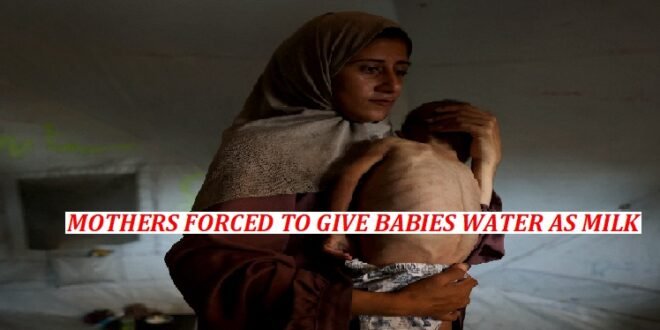02-08-2025
GAZA STRIP: Mothers across Gaza are forced to give their babies water to keep them alive, as milk and formula have become nearly impossible to find due to Israel’s suffocating blockade of aid, media explains.
Hani Abu Rizq walks through Gaza City’s wrecked streets with two bricks tied against his stomach as the rope cuts into his clothes, which hang loose from the weight he has lost.
 The 31-year-old searches desperately for food to feed his mother and seven siblings with the bricks pressed against his belly, an ancient technique he never imagined he would need.
The 31-year-old searches desperately for food to feed his mother and seven siblings with the bricks pressed against his belly, an ancient technique he never imagined he would need.
“We’re starved,” he says, his voice hollow with exhaustion.
“Even starvation as a word falls short of what we’re all feeling,” he adds, his eyes following people walking past.
He adjusts the rope around his waist, a gesture that has become as routine as breathing.
“I went back to what people did in ancient times, tying stones around my belly to try to quiet my hunger. This isn’t just war. It’s an intentional famine.”
The fading of Gaza’s heartbeat
Before October 7, 2023, and the start of Israel’s war on Gaza, food was the heartbeat of daily life in Gaza.
The days in Gaza were built around communal meals, breakfasts of zaatar and glistening olive oil, lunches of layered maqlooba and musakhan that filled homes with warmth, and evenings spent around trays of rice, tender meat and seasonal salads sparkling with herbs from gardens.
Abu Rizq remembers those days with the ache of someone mourning the dead.
The unmarried man used to love dining and gathering with family and friends. He speaks of comfortable dining rooms where home-cooked feasts were displayed like art and evenings were filled with desserts and spiced drinks that lingered on tongues and in memory.
 “Now, we buy sugar and salt by the gram,” he says, his hands gesturing towards empty market stalls that once overflowed with produce.
“Now, we buy sugar and salt by the gram,” he says, his hands gesturing towards empty market stalls that once overflowed with produce.
Israel has blamed the UN for the starvation crisis unfolding in the Gaza Strip, saying the global body had failed to pick up supplies.
UN officials, and several nations, have rejected that claim as false and stressed that Israel has refused to offer safe routes for humanitarian agencies to transport aid into Gaza.
Airdrops of humanitarian supplies, carried out in recent days, have also done little to address the widespread hunger crisis. Experts denounced the effort as dangerous, costly and ineffective.
Farhan Haq, deputy spokesperson for UN Secretary General Antonio Guterres, told reporters on Thursday that the UN and its partners “continue to seize every opportunity to collect supplies from the Israeli-controlled crossings and replenish those platforms with new supplies”.
“Our colleagues say that, despite Israeli announcements regarding the designation of convoy routes as secure, trucks continue to face long delays that expose drivers, aid workers, and crowds to danger,” Haq said.
“The long waits are because a single route has been made available for our teams exiting Kerem Shalom [Karem Abu Salem crossing] inside Gaza, and Israeli ground forces have set up an ad hoc checkpoint on that route.” (Int’l Monitoring Desk)
 Pressmediaofindia
Pressmediaofindia




